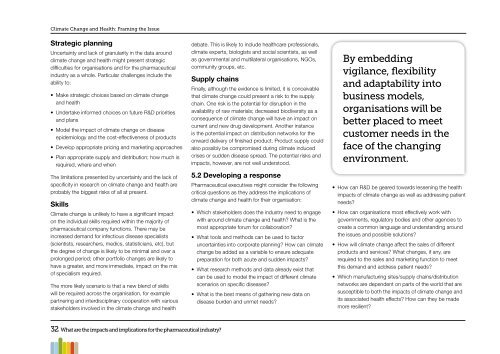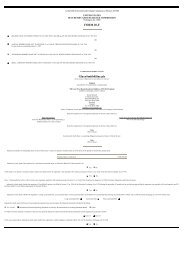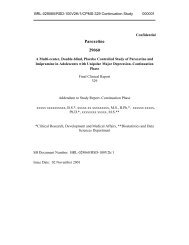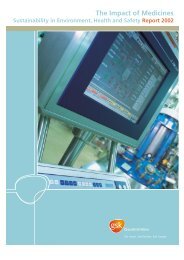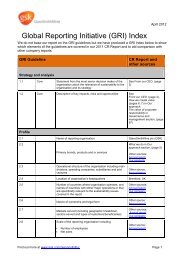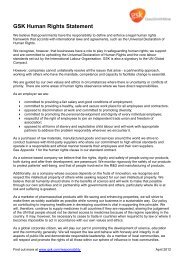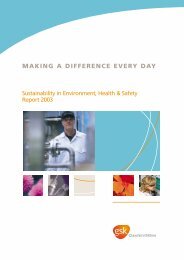Climate Change and Health: Framing the issue
Climate Change and Health: Framing the issue
Climate Change and Health: Framing the issue
Create successful ePaper yourself
Turn your PDF publications into a flip-book with our unique Google optimized e-Paper software.
<strong>Climate</strong> <strong>Change</strong> <strong>and</strong> <strong>Health</strong> <strong>Health</strong>: <strong>Framing</strong> Paper <strong>the</strong> Issue<br />
Strategic planning<br />
Uncertainty <strong>and</strong> lack of granularity in <strong>the</strong> data around<br />
climate change <strong>and</strong> health might present strategic<br />
difficulties for organisations <strong>and</strong> for <strong>the</strong> pharmaceutical<br />
industry as a whole. Particular challenges include <strong>the</strong><br />
ability to:<br />
• Make strategic choices based on climate change<br />
<strong>and</strong> health<br />
• Undertake informed choices on future R&D priorities<br />
<strong>and</strong> plans<br />
• Model <strong>the</strong> impact of climate change on disease<br />
epidemiology <strong>and</strong> <strong>the</strong> cost-effectiveness of products<br />
• Develop appropriate pricing <strong>and</strong> marketing approaches<br />
• Plan appropriate supply <strong>and</strong> distribution; how much is<br />
required, where <strong>and</strong> when<br />
The limitations presented by uncertainty <strong>and</strong> <strong>the</strong> lack of<br />
specificity in research on climate change <strong>and</strong> health are<br />
probably <strong>the</strong> biggest risks of all at present.<br />
Skills<br />
<strong>Climate</strong> change is unlikely to have a significant impact<br />
on <strong>the</strong> individual skills required within <strong>the</strong> majority of<br />
pharmaceutical company functions. There may be<br />
increased dem<strong>and</strong> for infectious disease specialists<br />
(scientists, researchers, medics, statisticians, etc), but<br />
<strong>the</strong> degree of change is likely to be minimal <strong>and</strong> over a<br />
prolonged period; o<strong>the</strong>r portfolio changes are likely to<br />
have a greater, <strong>and</strong> more immediate, impact on <strong>the</strong> mix<br />
of specialism required.<br />
The more likely scenario is that a new blend of skills<br />
will be required across <strong>the</strong> organisation, for example<br />
partnering <strong>and</strong> interdisciplinary cooperation with various<br />
stakeholders involved in <strong>the</strong> climate change <strong>and</strong> health<br />
032Introduction<br />
32 What are <strong>the</strong> impacts <strong>and</strong> implications for <strong>the</strong> pharmaceutical industry?<br />
debate. This is likely to include healthcare professionals,<br />
climate experts, biologists <strong>and</strong> social scientists, as well<br />
as governmental <strong>and</strong> multilateral organisations, NGOs,<br />
community groups, etc.<br />
Supply chains<br />
Finally, although <strong>the</strong> evidence is limited, it is conceivable<br />
that climate change could present a risk to <strong>the</strong> supply<br />
chain. One risk is <strong>the</strong> potential for disruption in <strong>the</strong><br />
availability of raw materials; decreased biodiversity as a<br />
consequence of climate change will have an impact on<br />
current <strong>and</strong> new drug development. Ano<strong>the</strong>r instance<br />
is <strong>the</strong> potential impact on distribution networks for <strong>the</strong><br />
onward delivery of finished product. Product supply could<br />
also possibly be compromised during climate induced<br />
crises or sudden disease spread. The potential risks <strong>and</strong><br />
impacts, however, are not well understood.<br />
5.2 Developing a response<br />
Pharmaceutical executives might consider <strong>the</strong> following<br />
critical questions as <strong>the</strong>y address <strong>the</strong> implications of<br />
climate change <strong>and</strong> health for <strong>the</strong>ir organisation:<br />
• Which stakeholders does <strong>the</strong> industry need to engage<br />
with around climate change <strong>and</strong> health? What is <strong>the</strong><br />
most appropriate forum for collaboration?<br />
• What tools <strong>and</strong> methods can be used to factor<br />
uncertainties into corporate planning? How can climate<br />
change be added as a variable to ensure adequate<br />
preparation for both acute <strong>and</strong> sudden impacts?<br />
• What research methods <strong>and</strong> data already exist that<br />
can be used to model <strong>the</strong> impact of different climate<br />
scenarios on specific diseases?<br />
• What is <strong>the</strong> best means of ga<strong>the</strong>ring new data on<br />
disease burden <strong>and</strong> unmet needs?<br />
By embedding<br />
vigilance, flexibility<br />
<strong>and</strong> adaptability into<br />
business models,<br />
organisations will be<br />
better placed to meet<br />
customer needs in <strong>the</strong><br />
face of <strong>the</strong> changing<br />
environment.<br />
• How can R&D be geared towards lessening <strong>the</strong> health<br />
impacts of climate change as well as addressing patient<br />
needs?<br />
• How can organisations most effectively work with<br />
governments, regulatory bodies <strong>and</strong> o<strong>the</strong>r agencies to<br />
create a common language <strong>and</strong> underst<strong>and</strong>ing around<br />
<strong>the</strong> <strong>issue</strong>s <strong>and</strong> possible solutions?<br />
• How will climate change affect <strong>the</strong> sales of different<br />
products <strong>and</strong> services? What changes, if any, are<br />
required to <strong>the</strong> sales <strong>and</strong> marketing function to meet<br />
this dem<strong>and</strong> <strong>and</strong> address patient needs?<br />
• Which manufacturing sites/supply chains/distribution<br />
networks are dependent on parts of <strong>the</strong> world that are<br />
susceptible to both <strong>the</strong> impacts of climate change <strong>and</strong><br />
its associated health effects? How can <strong>the</strong>y be made<br />
more resilient?


